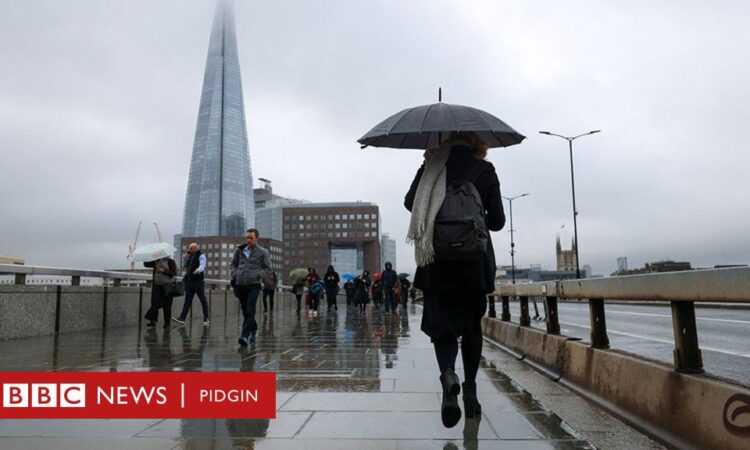
Wia dis foto come from, Getty Images
Di UK don fall into recession during di final three months of last year, official figures show, afta di economy reduce by more dan expected.
Gross domestic product (GDP) – one key measure of economic activity – drop by 0.3% between October and December.
E follow one fall between July and September. Di UK dey considered to dey for recession if GDP fall for two three-month periods back to back.
Di figure go be disappointment to Prime Minister Rishi Sunak
To grow di economy na one of five pledges wey e bin make for January 2023. Meanwhile, Chancellor Jeremy Hunt dey less dan three weeks away to present im latest Budget.
Shadow chancellor Rachel Reeves tok say di data show say Oga Sunak promise to grow di economy don “tear to pieces”.
Di goment fit use growing GDP as evidence say e dey do one good job of managing di economy. Also, if GDP fall, opposition politicians say di goment dey run am badly.
If GDP dey go up steadily, pipo dey pay more in tax sake of say dem dey earn and spend more. Dis one mean more money for di goment wey e fit choose to spend on public services, like schools, police and hospitals.
Goments also like to keep eye on how much dem dey borrow as e relate to di size of di economy.
Treasury sources don confam to BBC News say di chancellor dey look one larger plan on public spending as way to deliver tax cuts for di Budget on 6 March.
Forecasts for di public finance don materially go down for recent weeks as interest costs on UK goment borrowing don increase. Dem neva make final decisions.
As e chook mouth on GDP, Oga Hunt say: “While interest rates dey high – so di Bank of England fit bring inflation down – low growth no be surprise.”
E add say “signs say di British economy dey turn one corner” dey.
But Oga Reeves say: “Dis na Rishi Sunak recession and di news go deeply worry for families and business across Britain.”
Figures from di Office for National Statistics show say during di final three months of last year, dem feel slow movement for all di main sectors wey e measure to determine di health of di economy, including construction and manufacturing.
Di figure for di final three months of last year worse pass one 0.1% fall wey dey widely forecast by financial markets and economists.
GDP for di third quarter, between July and September bin fall by 0.1%.
Ruth Gregory, wey be deputy chief UK economist for Capital Economics, bin tok say di latest economic figures “fit nudge di Bank of England one little closer to cutting interest rates”.
“But we doubt say di Bank go dey too worried about wetin fit likely be mild and short recession,” she bin add.
Recent figures show say inflation – wey measure di pace of price prises – remain for 4% for January.
Di Bank of England bin don dey lift interest rates to put di brakes on inflation but don keep dem for 5.25% since August last year.
For di whole year, di economy bin grow by 0.1%.
“While e now don shrink for two quarters back to back, across di whole of 2023 di economy don dey broadly flat,” Liz McKeown, director of economic statistics for ONS, tok.
Nevertheless, make we comot Covid years, annual growth last year na di weakest since 2009 wen di UK and major economies bin dey roll from di global financial crisis.
Meaning of recession
Recession dey happun wen di kontri gross domestic product or GDP bin get negative growth for, most times, two consecutive quarters.
Gross Domestic Product na di total moni value or market value of all di finished goods and services wey dem dey produce within di kontri to sell to other kontris.






